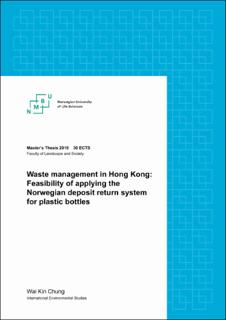| dc.description.abstract | Materials become “waste” when they are discarded into wrong places. Much plastics waste is recyclable but ends up in landfills or dispersed into the environment. Hong Kong is one of the world’s megacities suffering from poor plastics waste management. PET bottle is a prominent category of landfilled plastics and attracted attentions of waste planners. Deposit return systems for plastic bottles have been seen as a potential solution for the plastic bottles waste. In this research, I investigate how deposit return systems could be used to improve the plastics waste management in Hong Kong. Since Norway is reputable with its high recovery rate of returnable beverage containers under a deposit return system, I explore the feasibility of applying the Norwegian deposit return system for plastic bottles in Hong Kong. The research questions are addressed qualitatively by interviews, which provide a comprehensive understanding of the plastics waste management in Hong Kong and the Norwegian deposit return system. Stakeholders in the Hong Kong recycling sector and two key players in the Norwegian deposit return system (Infinitum and Tomra Systems) were interviewed. I argue that applying the Norwegian tax-based policy framework is justified by Norway’s achievement, such as the high collection rate, supply of high-quality plastic bottles and its financial sustainability. Also, I found that reverse vending machines technologies are mature, and they are helpful to complement the deposit return system. However, I argue that Hong Kong needs adaptation for implementing a deposit return system because of the spatial limitations. For instance, I suggest that tiny and small retailer shops can opt-out to be collection spots. Instead, collection spots beyond retail stores shall be established, and higher engagement of the Hong Kong government will be needed. | en_US |

